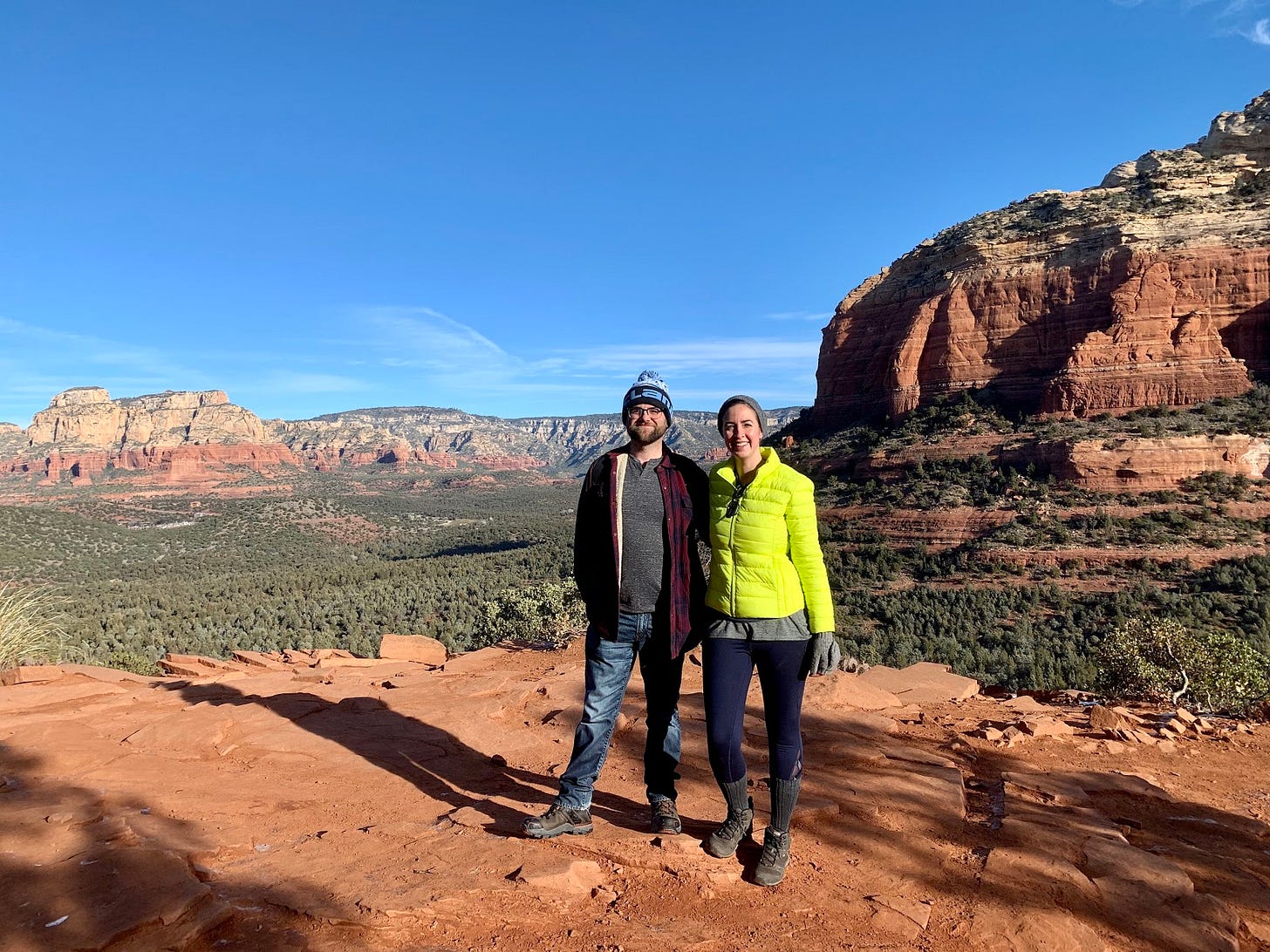So this is the new year
You can start whenever—and wherever—you want.
Billy and I slowly made our way down from the peak of the Devil’s Bridge Trail. It was early, and few other hikers were around. We walked in agreeable silence, breathing in the crisp mountain air, taking in the unfamiliar scenery, and listening to the rhythm of our steps.
As we rounded a bend that revealed yet another stunning vista, Billy spoke up.
“I feel like this is the real start of our new year,” he said.
We spent last week in Arizona, a vacation prompted by a work trip; after a few days of working in Phoenix, we headed to Sedona for fun. The trip was wonderful — the kind of nourishing experience that kept us commenting on how fortunate we were.
The routine we adopted in Arizona felt like the dream version of how things could be. Day after day, we woke up early, got lots of exercise and fresh air, ate healthy food, enjoyed quality time together, relaxed in the hot tub, set aside time for reading and writing, abstained from alcohol, and went to bed early. We became aspirational versions of ourselves, and it felt good.
As our vacation wound to a close, I started feeling sad. The thought of returning home — and returning to old habits — weighed heavily on my mind. Then I remembered Billy’s comment on our hike. Could I possibly use this trip as a fresh start?
It’s tempting to wait for the perfect milestone to adopt good habits or drop bad ones. We often choose birthdays, the start of a new calendar year, or some other time when the conditions are just right to begin working toward goals. Unfortunately, it’s a flawed approach. In my experience, a specific date is either too far away or the conditions are never quite what I want them to be. The best tactic, I’m learning, is to start right now.
I brought Better Than Before, Gretchen Rubin’s 2015 book about habit building, with me to Arizona. In a bit of serendipitous timing, I found it at a used bookstore a few weeks prior. I couldn’t have planned a better occasion to read it than while I was in Sedona, living the life I wanted to live.
“Now is an unpopular time to take a first step. Won’t things be easier — for some not-quite-specified reason — in the future?” Rubin wrote. “I have a fantasy of what I’ll be like tomorrow. Future-Gretchen will spontaneously start a good new habit, with no planning and no effort necessary; it’s quite pleasant to think about how virtuous I’ll be, tomorrow. But there is no Future-Gretchen, only Now-Gretchen.”
Her logic made sense. Why shouldn’t I consider that soul-cleansing hike as the clean slate I’ve been looking for?
Rubin explains that, for some people, telling others about their goals can be an effective tool in achieving them. “Accountability is a powerful factor in habit formation, and a ubiquitous feature in our lives. If we believe that someone’s watching, we behave differently,” she wrote. “Deadlines help us keep the habit of working. Late fees help us pay our bills on time. Grades help us study. Attendance records help us get our children to school on time. When we believe that we may be held accountable for our actions—even when we’re accountable only to ourselves—we show more self-command.”
I can attest to the effectiveness of accountability. So, dear readers, here are the things I want to do more of — my new New Year’s resolutions, if you will: I want to drink less, write more, exercise harder, sleep better, and invest more time and energy in the relationships I care most about.
A sometimes-frustrating rule of habits is that it’s difficult to adopt multiple new behaviors at once. It’s intimidating to look at that list of goals, feeling unsure where to begin, how to approach those behaviors, and determine whether they’re working.
The good news is that positive habits tend to build on each other.
For me, drinking less seems like the goal I should start with. I’m already in the midst of Dry January, and there’s no reason I can’t keep up the habit of abstaining from alcohol once the month is over. Choosing not to drink booze (or, let’s be honest, to do so only seldom) will likely help me achieve my goal of sleeping better. With more quality sleep, I’ll have a clearer head for writing and more energy for exercising (which, in turn, will also benefit sleeping — it all connects!). And with many positive things going on by that point — the writing to be proud of, the sleep to be energized by, the exercise to feel good about — I’ll be more motivated to reach out to the people I love.
This, of course, is the ideal scenario. Aspirational me would adopt all of these good habits with flying colors. In reality, there will be stumbling blocks. For starters, spending more time with friends might sometimes feel awkward without the crutch of alcohol to lean on. Getting into a consistent writing routine is often a struggle for me, especially when it comes to the daunting goal of someday writing a book. I might get so wrapped up in my aims for better sleep that I’ll have trouble quieting my brain when it’s time to go to bed. And there’s always the possibility of various events out of my control that could throw all of my good behaviors into disarray.
Still, I have to remind myself that there’s no perfect future opportunity to do these things. The time is now. The new year is whenever I want it to be.
There’s a quote from writer Annie Dillard that I think about often: “How we spend our days is, of course, how we spend our lives.”
Here’s how I don’t want to spend my days: Starting at my phone instead of what’s in front of me; feeling lethargic and frustrated by unhealthy choices; getting in dumb fights versus addressing underlying issues; letting yet another opportunity pass by to reach out to someone I care about; continually choosing to do easy tasks over fulfilling work; allowing regrets to pile up and anxieties to mount.
Whenever I think about how I want to spend my time, I inevitably reflect on the people I love who have died. They no longer get the luxury of considering their lives and routines, to course-correct their habits. For me, that’s the ultimate motivation to start structuring my days in a more mindful way.
What an ideal day looks like will vary for everyone. Some of the habits Rubin writes about sound downright painful to me; just as I’m sure she’d turn up her nose at some of the things I’d like to focus on. It’s important to know what lights you up, and to make a conscious choice to do more of those things.
I felt happy in Arizona; I was inspired, content, and energized. I was a better version of me, and not just because I was on vacation. The things I enjoyed — better sleep, healthier eating and drinking, time outdoors, solid exercise, plenty of reading and writing, and quality time with my partner — aren’t impossible back home. Doing those things more regularly requires a shift in mindset and routine, and the self-discipline to keep it up. And I’m ready to do just that, starting now.
Happy new year, friends.
xoxo KHG
p.s. What habits are you currently aiming to adopt or lose? Do you have any tips for drinking less, getting better sleep, or writing more? Has there been an unconventional time in your life when you successfully started anew? Reply to this email, and let me know. I’ll share some of your responses in Thursday’s subscriber-only newsletter.
This newsletter is written by Katie Hawkins-Gaar. It’s edited by Rebecca Coates, who just got a new Fitbit and wants to follow in Katie’s footsteps (pun intended) and walk 10,000 steps a day!




